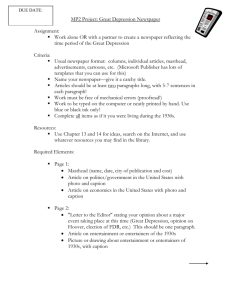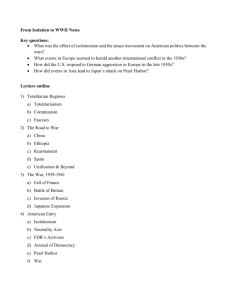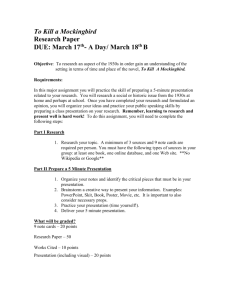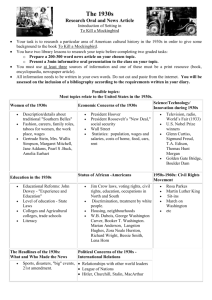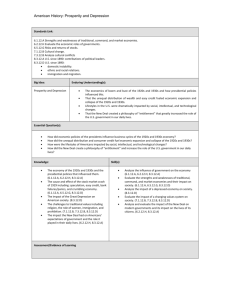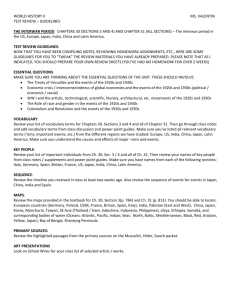Click on each of the separate pages!! (IN PRINT, ON THE AIR
advertisement
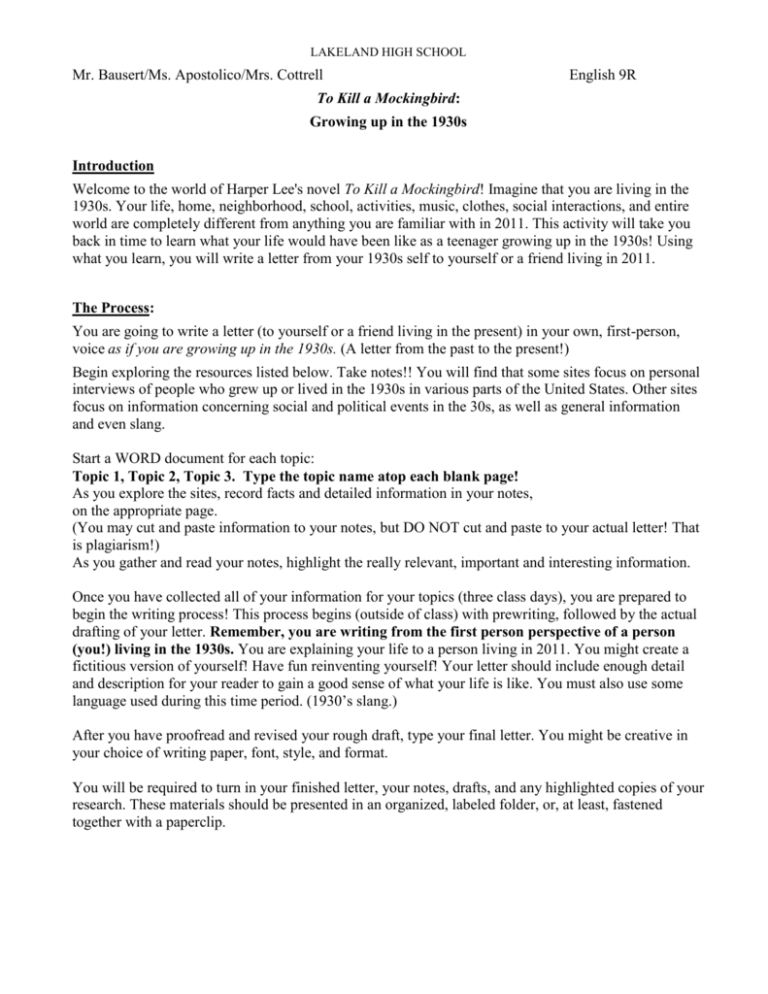
LAKELAND HIGH SCHOOL Mr. Bausert/Ms. Apostolico/Mrs. Cottrell English 9R To Kill a Mockingbird: Growing up in the 1930s Introduction Welcome to the world of Harper Lee's novel To Kill a Mockingbird! Imagine that you are living in the 1930s. Your life, home, neighborhood, school, activities, music, clothes, social interactions, and entire world are completely different from anything you are familiar with in 2011. This activity will take you back in time to learn what your life would have been like as a teenager growing up in the 1930s! Using what you learn, you will write a letter from your 1930s self to yourself or a friend living in 2011. The Process: You are going to write a letter (to yourself or a friend living in the present) in your own, first-person, voice as if you are growing up in the 1930s. (A letter from the past to the present!) Begin exploring the resources listed below. Take notes!! You will find that some sites focus on personal interviews of people who grew up or lived in the 1930s in various parts of the United States. Other sites focus on information concerning social and political events in the 30s, as well as general information and even slang. Start a WORD document for each topic: Topic 1, Topic 2, Topic 3. Type the topic name atop each blank page! As you explore the sites, record facts and detailed information in your notes, on the appropriate page. (You may cut and paste information to your notes, but DO NOT cut and paste to your actual letter! That is plagiarism!) As you gather and read your notes, highlight the really relevant, important and interesting information. Once you have collected all of your information for your topics (three class days), you are prepared to begin the writing process! This process begins (outside of class) with prewriting, followed by the actual drafting of your letter. Remember, you are writing from the first person perspective of a person (you!) living in the 1930s. You are explaining your life to a person living in 2011. You might create a fictitious version of yourself! Have fun reinventing yourself! Your letter should include enough detail and description for your reader to gain a good sense of what your life is like. You must also use some language used during this time period. (1930’s slang.) After you have proofread and revised your rough draft, type your final letter. You might be creative in your choice of writing paper, font, style, and format. You will be required to turn in your finished letter, your notes, drafts, and any highlighted copies of your research. These materials should be presented in an organized, labeled folder, or, at least, fastened together with a paperclip. Your Letter: 1. Opening: Briefly introduce yourself. Who are you? Where do you live? What is your daily life like? Give a brief overview of the information that you will discuss in your letter. 2. Discuss THREE topics below (or speak to me about choosing your own topic). Your letter must focus on at least THREE of the following aspects of your life. (Each topic is one full, detailed, developed paragraph.) Your Family. What is your family like? How do your parents make a living? What is your standard of living? (Rich, poor, middle class?) How has your family been affected by the Great Depression? What activities do you enjoy as a family? What are some of the most popular products? How much do they cost? What items does your family want to buy? Your Home. Describe your home and neighborhood in detail. Include a myriad of specific and interesting information so that the reader of your letter can visualize your environment. What are some of the most popular products? How much do they cost? What items do you want to buy? The World Around You. What's happening in America politically and economically? Who is the President? What is happening with the Great Depression? What’s happening in the world? Sports. What sports are popular? What is happening in professional sports? What sports do you play? How is this sport different form today’s version? Fashion. What kinds and styles of clothes are popular? What kind of clothes do you wear? Your family? What are some of the most popular products? How much do they cost? What items do you want to buy? Music. What kinds of music do you listen to? Who are your favorite artists? Your favorite songs? Where/how do you listen to music? Describe what the music sounds like. Include some lines from lyrics. School/Education. Describe, in detail, your school, classroom, class mates, and teachers. Where do you go to school? What subjects are you studying? What topics are you learning about? Food. What types of foods do you eat? What are your favorites? Identify and discuss brand name food products and how they are a part of your life. Include prices. Entertainment. What do you do for entertainment? Discuss specific forms of entertainment (newspaper, comics, books, radio, television(?), movies, games, etc.) that you enjoy. Inventions. The 1930’s is a time period marked by innovation and invention. Discuss specific inventions during this time period and how each invention affects your life. Let me know if there’s a different topic you’d like to research. What aspect of your 2011 life would you like to learn more about for the 1930’s? (Westchester/New York City in the 1930s, art, dance, automobiles, etc.) Evaluation: This activity will count as a Classwork grade (three days of research) and a major Test/Writing grade (the letter, drafts, notes), and will be evaluated according to the following criteria: Did you make good use of your class time? Do you have a complete, revised, edited, finished letter? Did you begin your letter by introducing your 1930s self to someone in 2011? Is your letter focused on at least three of the topics described in this packet? Does your letter contain accurate details and factual information about life in the 1930s? Do you use some language appropriate for the 1930s? Did you follow the writing process? (Prewriting, Drafting, Revising, Editing, Publishing.) Does your letter show improvement from first draft to final copy? Is the presentation of your letter, notes, and drafts neat and professional? Is it in a folder or fastened with a large paperclip? Conclusion After completing the research and letter, you will be better able to identify and understand the setting, characters, and situations presented in the novel To Kill a Mockingbird. DUE DATE: WEDNESDAY, FEBRUARY 16TH. RESOURCES: Begin by browsing these top sites. Each offers an excellent introduction to the 1930s… Remember to take notes as you go!!! Do not google. These sites have been reviewed and will actually save you time! Explore these sites thoroughly!!! Click on links… http://kclibrary.lonestar.edu/decade30.html (Events, sports, fashion, education, art, music, entertainment, etc.) http://library.thinkquest.org/J0111064/30home.htm http://xroads.virginia.edu/~1930s/front.html ***Click on each of the separate pages!! (IN PRINT, ON THE AIR, TIMELINE, etc.) http://www.thepeoplehistory.com/1930s.html These sites focus on specific topics: Stock Market Crash: http://www.mce.k12tn.net/1920/crash.htm Great Depression: http://www.mce.k12tn.net/1920/depression.htm Dust Bowl & Great Depression http://edsitement.neh.gov/view_lesson_plan.asp?id=300 Federal Works Progress Administration started by the federal government during the Depression. http://lcweb2.loc.gov/wpaintro/intro01.html Real stories: http://www.michigan.gov/dnr/0,1607,7-153-54463_18670_18793-53511--,00.html New Deal: http://www.mce.k12tn.net/1920/deal.htm Race Issues: http://americanradioworks.publicradio.org/features/remembering/bitter.html Fun & Entertainment: http://www.mce.k12tn.net/1920/activities_30s.htm Hobo teens ride the rails!: http://www.pbs.org/wgbh/amex/rails/ Music: http://library.thinkquest.org/5255/1930s/1930introduction.html Sports: http://www.sportplanet.com/sbb/apfas/30R.HTM http://www.history-timeline.deepthi.com/sports-history-timeline/sports-timeline-1931-1940.html *Products & Prices: http://www.thepeoplehistory.com/30sfood.html Food: http://www.foodtimeline.org/fooddecades.html - 1930s The Federal Writers' Project of the 1930s recorded more than 10,000 life stories of men and woman from a variety of occupations and ethnic groups. This site is a sampling of these interviews. http://lcweb2.loc.gov/wpaintro/exinterv.html Interview: Growing Up White in the South in the 1930s The women in this interview grew up in the deep South of the 1930s. All three were members of prominent southern families. http://www.library.thinkquest.org/12111/girl.html Interview: Growing Up Black in the 1930s Interview of Mrs. Peacolia Barge who grew up just outside Birmingham, Alabama, in the 1930s. http://library.thinkquest.org/12111/mculley.html Related Vocabulary: Dust Bowl Definition:A large region covering the southern Great Plains of the United States that suffered drought, crop failures, and intense dust storms in the 1930s Great Depression Definition:A period of worldwide economic downturn that began in 1929 and extended into the early 1940s, characterized by unemployment, poverty, hunger, and despair Context At the height of the Great Depression, about 13 million people were out of work-about one out of every four workers in the country. Immigrant Definition:A person who comes to a country to live there Context:African Americans, Mexican immigrants, and women were also hard hit by the Depression. Migrant Definition:A person who moves regularly to find work, especially one who harvests crops Context:Homeless and jobless, many migrants were left to fend for themselves, living in tents or cardboard shacks without water or electricity. New Deal Definition:A series of federal programs introduced by Franklin D. Roosevelt in the 1930s to encourage economic reform Context:FDR's New Deal aimed at rebuilding the economy, helping the jobless, and preventing future depressions. Sharecropper Definition:A tenant farmer who is provided with credit for seed, tools, living quarters, and food, who works the land, and who receives an agreed share of the crop's value minus expenses Context:Four generations had worked the land as sharecroppers. Speculation Definition:Engaging in a big financial risk in hopes of making a big profit Context:The Great Depression was caused by overproduction and speculation. Union Definition:An organization of workers formed to protect its members' rights and to advance their interests, such as wages and working conditions Context:The United Auto Workers was the strongest union in America. *This activity and WebQuest is based on similar projects by Jill Clark and Jan Hedberg, and Susan Dudsic.
